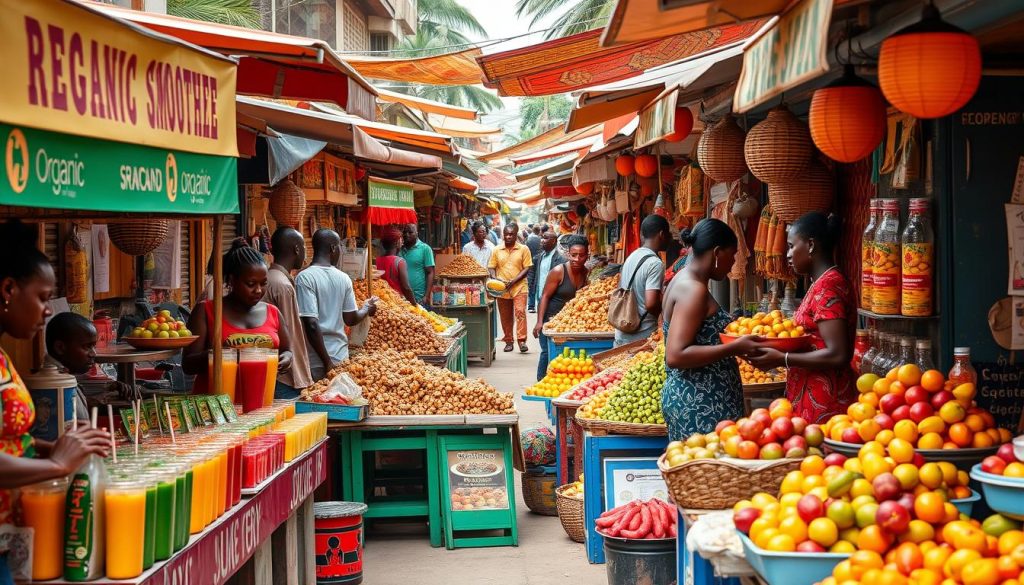The Africa food industry is changing fast, full of chances for new entrepreneurs. This article looks at fresh food and drink business ideas for the African market. With more people wanting to try new foods, it’s key to know what’s trending and what people want.
Businesses can succeed by being green, using local products, and embracing new tech. Let’s dive into the trends and models that will shape Africa’s food and drink scene.
Understanding the African Culinary Landscape
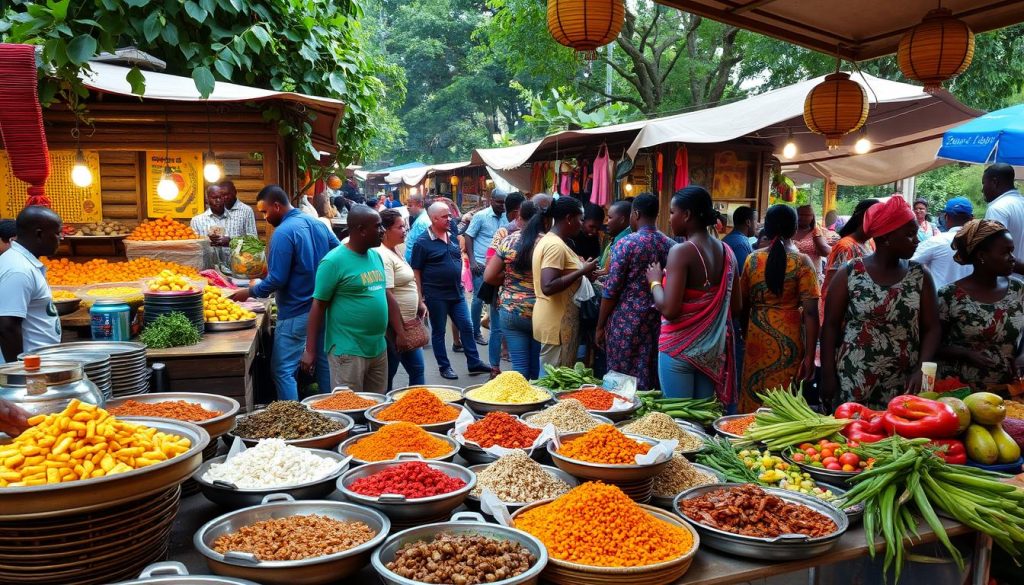
The African culinary scene is a vibrant mix of different traditions, cultures, and places. It shows the rich diversity of African food, with each region having its own special dishes. For example, North Africa’s spicy stews are very different from the milder foods of sub-Saharan Africa.
Popular dishes in Africa often mix local ingredients with influences from outside. This makes African food both interesting and loved by people everywhere. With more people moving to cities, new food trends are appearing. These trends mix old recipes with new cooking methods, creating exciting dishes.
More people are now looking for healthy food options. This change is making businesses create dishes that are both tasty and good for you. By embracing these trends, Africa can become a hub for innovative food ventures and share its rich food story with the world.
Embracing Local Ingredients in Food Businesses
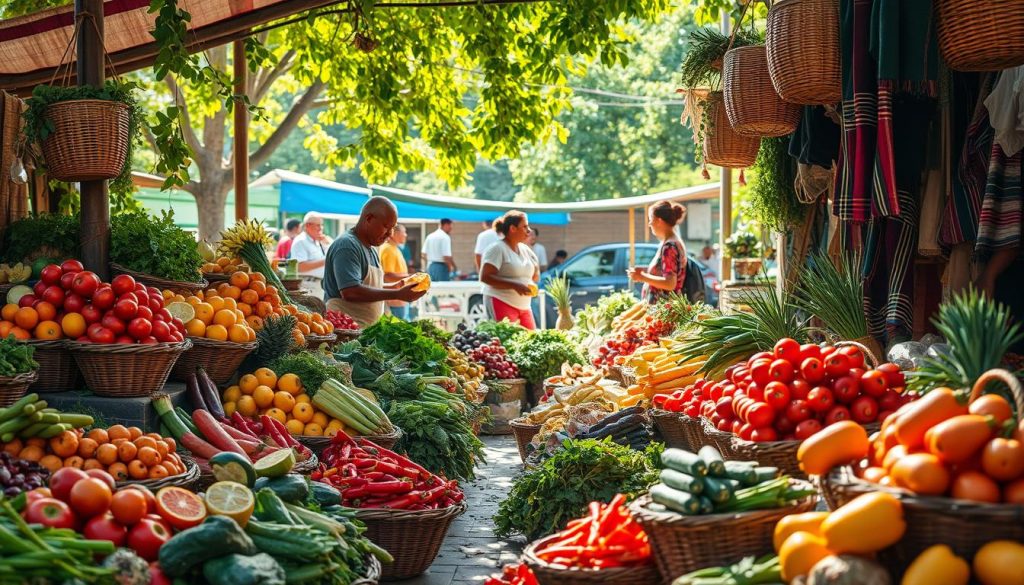
Using African local ingredients in food businesses is key to authenticity and sustainability. It boosts the quality of food and helps local farmers. This move also meets the growing need for clear food sources.
Benefits of Using Locally Sourced Products
There are many good reasons to use African local ingredients:
- Fresher produce makes dishes taste better.
- It saves money and is better for the environment.
- It helps local economies through fair trade.
- It builds stronger ties with the community by supporting local suppliers.
Promoting Sustainability Through Local Sourcing
Today, sustainable food practices are essential. Businesses that source locally reduce their carbon footprint. This attracts eco-aware customers and strengthens the brand’s green image.
Successful African MSMEs show how supporting local farming boosts interest in native foods. This creates a greener food system.
Food and Beverage Business Ideas in Africa
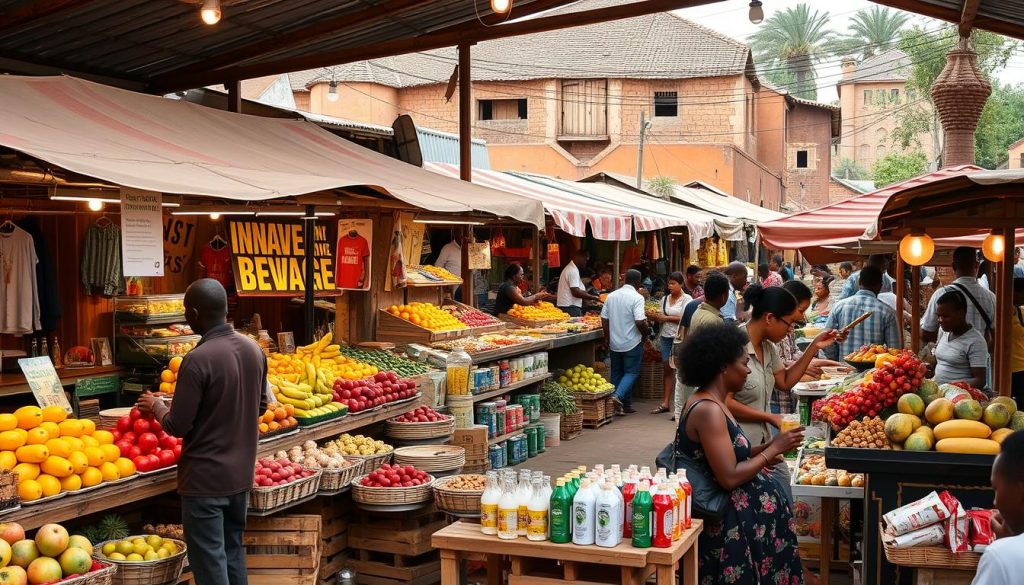
The African food and beverage industry is full of potential. Entrepreneurs can find many ways to make money by using the continent’s unique tastes and cooking styles. Some great ideas include:
- Speciality coffee shops that showcase local beans and artisanal brewing methods.
- Ethnic fine dining establishments offering authentic regional dishes.
- Health-focused cafes that cater to the growing demand for nutritional options and dietary restrictions.
There are also chances to create traditional African snacks. You could use local herbs and spices. Or, you could make meal kits that show off the continent’s rich food heritage. These ideas are great for combining cultural identity with modern tastes.
By focusing on unique dining experiences and being true to local tastes, entrepreneurs can do well. They can meet both local and global culinary trends.
The Rise of Mobile Food Trucks
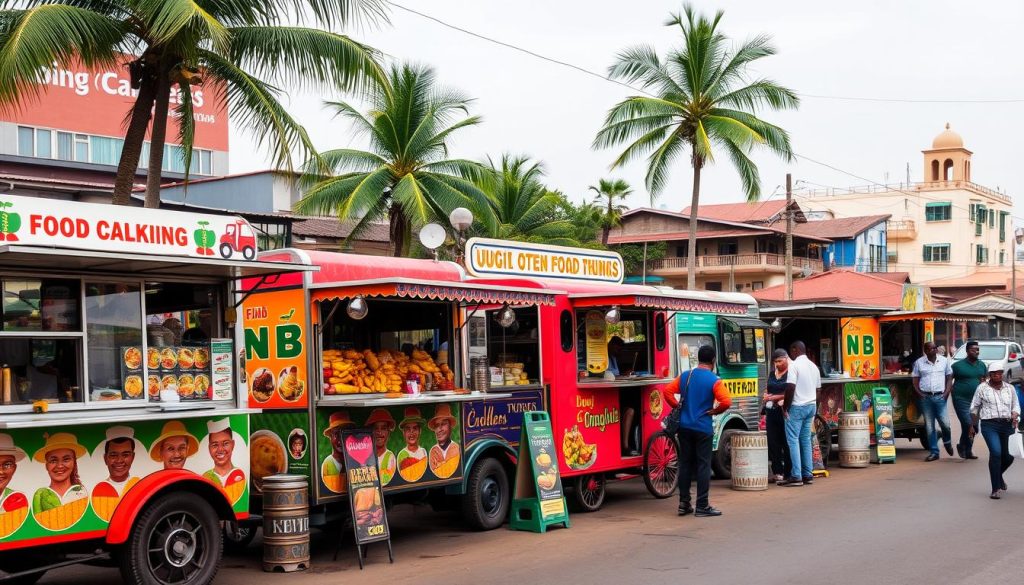
Mobile food trucks are popping up all over Africa’s cities. This new trend is changing how we eat. It lets entrepreneurs start small and move around to where people want to eat.
Street food in Africa is now more varied and easy to find. People love trying new foods on the go.
Advantages of Mobility in Food Services
Food trucks offer big benefits that brick-and-mortar places can’t match:
- They can go to busy spots and events, making more sales.
- They don’t need a big space, so they can offer lots of different foods.
- They can quickly change their menu to keep up with what people want.
Popular Cuisines for Food Trucks in Africa
Food trucks in Africa are famous for serving local favourites. Some top dishes are:
- Bunny chow, a loaf filled with spicy curry.
- Boerewors rolls, a tasty sausage in a warm roll.
- Jollof rice, a colourful dish loved in West Africa.
As cities get bigger, the need for these easy, tasty meals will only grow. Mobile food trucks are here to stay in Africa’s food scene.
Innovative Beverage Concepts for Africa’s Markets

The drink scene in Africa is changing fast. People want new tastes and healthier drinks. Craft breweries and new distillery trends are leading this change.
Exploring Craft Breweries and Distilleries
Craft breweries in Africa are all about unique flavours and local ingredients. Young people love these drinks for their authenticity. Old distilleries are also getting popular, offering drinks like mampoer.
These drinks celebrate local culture and are better for the planet than mass-produced ones.
Health-Conscious Beverage Options
There’s a big push for drinks that are good for you. Cold-pressed juices, kombucha, and spirit-free cocktails are all the rage. They taste great and are healthy.
This trend meets the needs of health-conscious consumers. It opens up new possibilities for drinks across Africa.
The Success of Plant-Based Foods
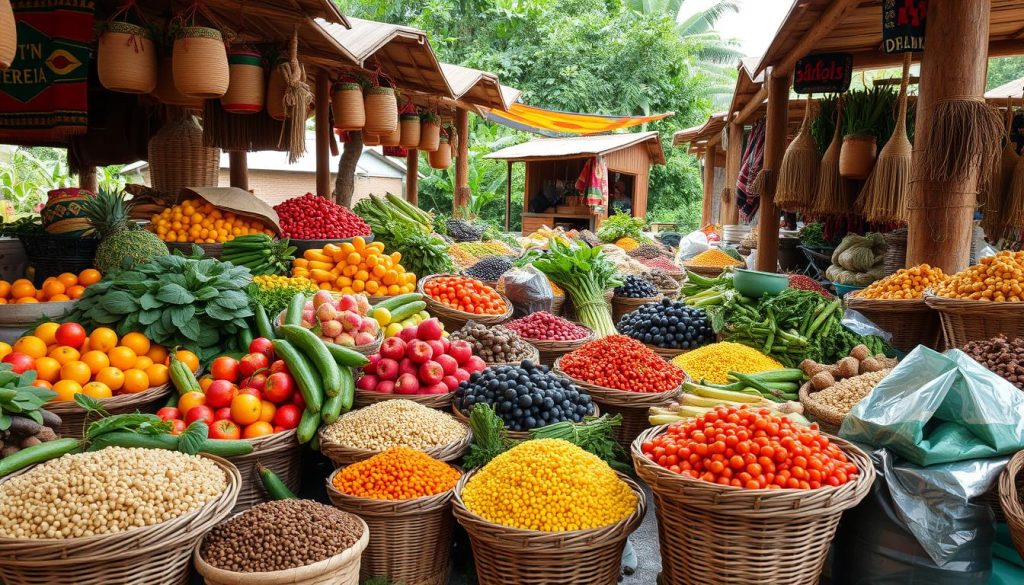
The plant-based food movement is booming in Africa. It shows a global trend towards healthier eating and food sustainability. More people are choosing a plant-based diet, driving demand for vegan business ideas.
Brands are now offering meat-free versions of traditional dishes. This approach is winning over many consumers.
Several pioneering plant-based brands have popped up. They use local ingredients to create products that appeal to African tastes. These products also highlight health benefits and environmental awareness.
Examples include:
- Meatless stews that use legumes and grains instead of meat.
- Snacks made from local vegetables and fruits.
- Alternative proteins like tempeh and seitan, made for African tastes.
These businesses are meeting a growing demand for new, healthier foods. By focusing on sustainability and local ingredients, they attract health-conscious consumers. They also support the move towards eco-friendly diets.
Leveraging Technology in Food Delivery Services

The fast growth of food delivery tech is changing how we eat in Africa. Mobile apps make it easier to get our favourite foods. This change helps both customers and local restaurants.
The Impact of Apps on Food Accessibility
Mobile apps are key in making food more accessible. They let users look at menus, order, and pay easily. This tech helps people find more food options, especially in busy cities.
Building Partnerships with Local Restaurants
Working with local restaurants is crucial for food delivery services. It lets them offer more dishes, pleasing different tastes. This teamwork makes customers happy and helps local restaurants grow in a tough market.
Pop-Up Restaurants and Culinary Events

Pop-up dining experiences and temporary restaurants have changed the food scene. They let chefs show off their skills without the costs of a fixed place. These spots draw in food lovers looking for something new and special.
Culinary festivals in Africa are growing fast. They celebrate the variety of local food and bring people together. At these events, you can try different foods, meet chefs, and talk about food.
Many pop-up restaurants have won over fans, making the local food scene better. Cities across Africa are welcoming this trend. It strengthens community bonds and celebrates different food cultures.
In short, pop-up dining and culinary festivals are more than just trends. They change how we see and enjoy food. By focusing on creativity and community, they can shape Africa’s food culture.
Zero-Waste Food Businesses in Africa
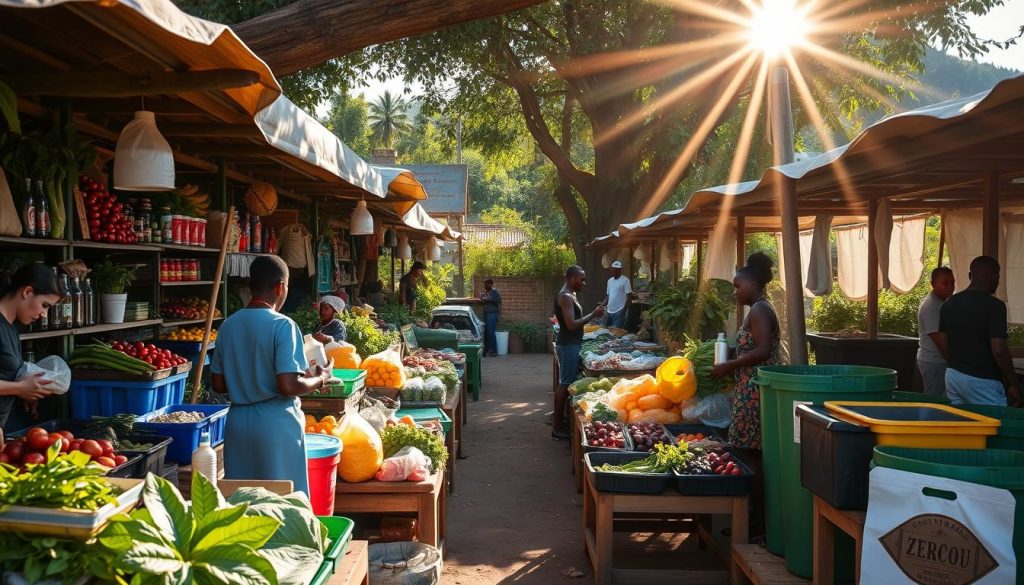
Zero-waste food businesses are leading the way in sustainability. They use new methods to cut down on waste and teach others about caring for the environment. By doing so, they help save the planet and work more efficiently.
Implementing Sustainable Practices in the Kitchen
To run a zero-waste business, many strategies are needed. These include:
- Composting food scraps to create nutrient-rich soil for local gardens.
- Recycling packaging materials, thereby reducing landfill waste.
- Utilising by-products creatively, such as making stock from vegetable peels.
These actions not only cut down on waste but also save money. They make kitchens more eco-friendly. As these businesses grow, they encourage others to join the zero-waste movement.
Community Engagement and Education
Teaching people about the environment is key to zero-waste success. By engaging with the community, businesses can teach people to live more sustainably. They can offer workshops and classes on:
- Creative ways to reduce food waste.
- Understanding the benefits of sustainable kitchen practices.
- The importance of recycling and composting in everyday life.
By building a sustainable culture, these businesses gain loyal customers. They also make a positive impact on their communities.
Catering to the Health and Wellness Sector
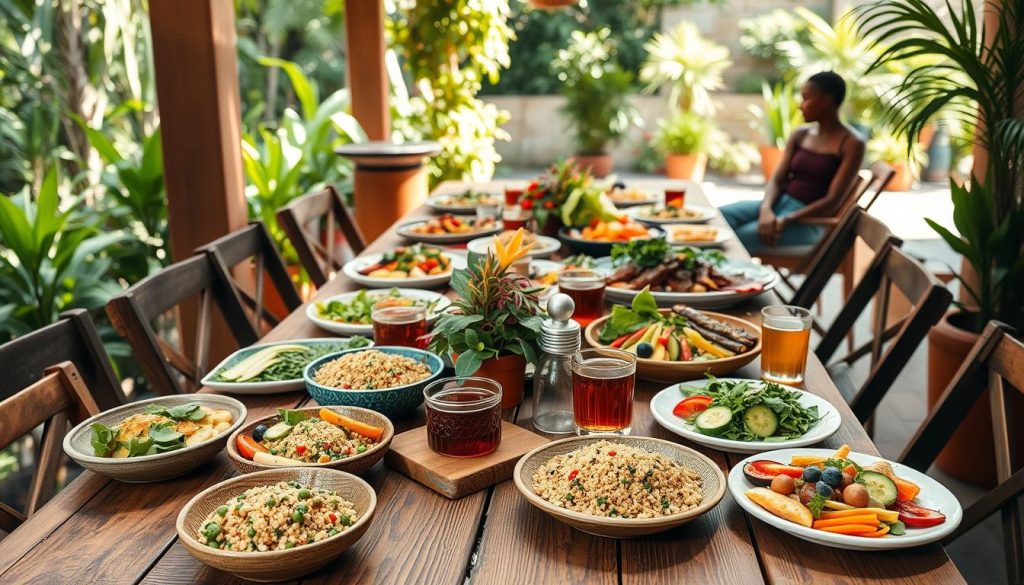
The need for health-focused dining is growing fast, changing the food and drink world. People want meals that fit their health goals, pushing businesses to change. In Africa, there’s a big push for nutritious food, with a focus on special diets like gluten-free and vegan.
Business owners can make the most of this trend by following a few key steps:
- Be open about where your ingredients come from and how they’re prepared to gain trust.
- Offer unique dishes that appeal to health-aware eaters, like seasonal specials or dishes packed with superfoods.
- Host workshops or share content on healthy eating and nutrition to engage with customers.
By adding these elements, you can keep customers coming back and promote a complete health and wellness approach. As health becomes a bigger priority, businesses that focus on it will see lots of chances to grow and succeed.
Exploring Ethnic Cuisine as Market Opportunities
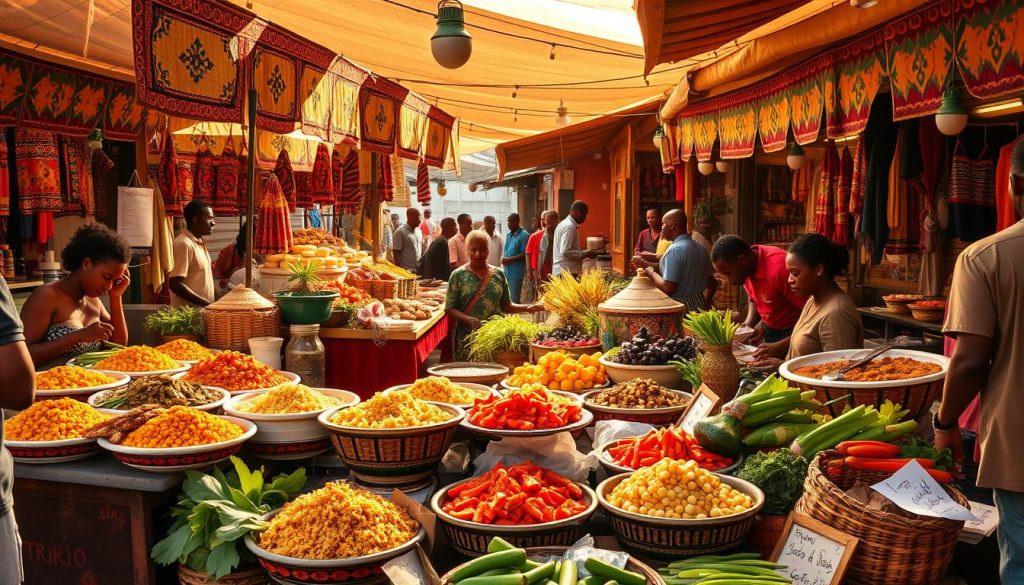
Ethnic cuisine from Africa is a thrilling area in the food world. It offers a chance to bring different cultures together through food. This not only makes cultural food experiences richer but also helps in global marketing.
Restaurants that serve authentic ethnic dishes become lively places. They celebrate the diverse cultures of Africa.
Bridging Cultural Gaps through Food
Food is a strong tool for connecting cultures. Restaurants that offer ethnic dishes help communities understand each other better. This way, people get to try new tastes and learn about different cultures.
Stories about the dishes’ origins and how they’re made make meals more interesting. It sparks people’s curiosity and deepens their appreciation for food.
Marketing Ethnic Dishes Globally
It’s key to use good global marketing to promote ethnic foods. Social media is a big help in showing off unique dishes. Owners can use eye-catching photos to draw in customers.
Working with food influencers can also help reach more people. Success stories of ethnic restaurants show how to brand and market well globally.
Online Grocery and Meal Kit Services
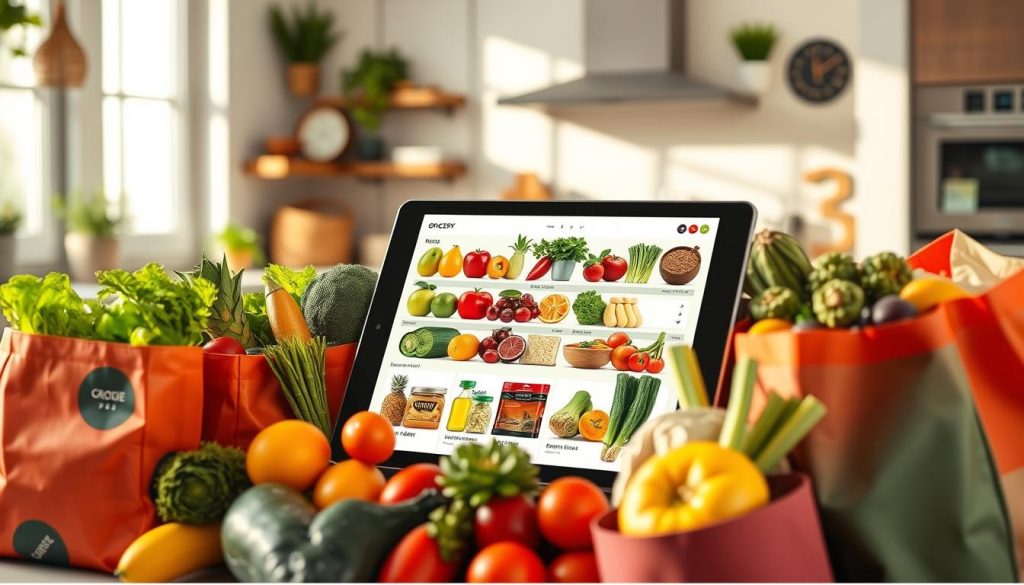
Online grocery shopping has changed how we buy food. Meal kits Africa bring tailored meals right to your door. They solve the problems of long queues and limited choices.
Meal kit companies use local ingredients to support sustainable farming. They appeal to those who want fresh, local food. These services teach cooking skills and make meals easy to prepare.
- Increasing accessibility to fresh produce
- Customisation of meal plans to fit individual preferences
- Encouragement of healthier eating habits
The demand for online grocery and meal kits is growing. Successful businesses need to understand what customers want. They use technology and work with local suppliers to meet these needs.
Innovations in Food Packaging
In Africa, food packaging is changing fast to tackle environmental issues and improve customer experience. More businesses are using sustainable packaging that meets green standards and appeals to eco-aware shoppers. This move to eco-friendly containers is key for keeping customers and standing out in the market.
Eco-Friendly Packaging Solutions
African companies are leading the way with green packaging options. They use biodegradable and reusable items to cut down on waste. These steps help create a closed-loop system, where products are made to be recycled or biodegradable, aiming to reduce waste.
Attracting Environmentally Conscious Consumers
As people become more aware of green living, brands that focus on sustainability gain loyal fans. By embracing eco-friendly packaging, companies boost their reputation and connect with today’s eco-minded consumers. This approach can make a brand more competitive and resilient in the fast-changing food market.

